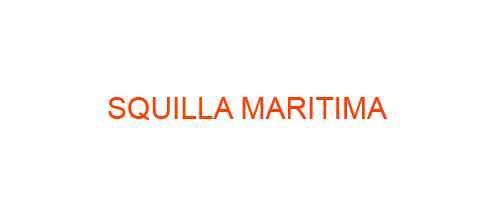Squilla maritima, commonly known as sea onion or sea squill, is a plant used in homeopathic medicine. It belongs to the Liliaceae family and is prima
Squilla maritima, commonly known as sea onion or sea squill, is a plant used in homeopathic medicine. It belongs to the Liliaceae family and is primarily found in coastal regions of the Mediterranean. In homeopathy, Squilla maritima is primarily used to treat respiratory and digestive disorders.
Properties and Preparation:
Squilla maritima is prepared from the fresh bulb of the plant.
The bulb is collected during the flowering season and is chopped into small pieces.
These pieces are macerated in a mixture of alcohol and water, and the resulting solution is then potentized to create the homeopathic remedy.
Symptoms treatment and materia medica:
Squilla maritima is known to have an affinity for the respiratory system, digestive system, urinary system, and cardiovascular system. It is often prescribed for conditions like bronchitis, pneumonia, asthma, gastritis, diarrhea, and urinary tract infections.
The remedy is also indicated for certain cardiac conditions, including palpitations and irregular heartbeat.
Cough with tough, stringy, and difficult-to-expectorate mucus, which may be tinged with blood.
Violent and spasmodic coughing fits, often worse at night.
Sensation of a lump in the throat or a tickling sensation, leading to a dry, hacking cough.
Sharp, stabbing pains in the chest or sides of the chest.
Shortness of breath, difficulty breathing deeply, or feeling suffocated.
Nausea and vomiting, especially after eating fatty or rich foods.
Indigestion with a sensation of fullness and bloating in the abdomen.
Diarrhea with frequent urging, watery stools, and rumbling in the abdomen.
Urinary symptoms like frequent urination, burning sensation, or involuntary passage of urine.
Cold and clammy extremities, with a tendency to sweat profusely.
Sensation of heaviness and weakness in the limbs.
Headache with a bursting, throbbing pain, usually worse on the left side.
Dry, itchy, or burning sensation in the eyes, often accompanied by watering.
Allergic symptoms, such as sneezing, itching, and watery discharge from the nose.
Restlessness, irritability, and anxiety, especially during illness.
Frequently Asked Questions (FAQ):
Q: Is Squilla maritima safe to use?
A: Homeopathic remedies are generally considered safe when used as directed. However, it’s advisable to consult a qualified homeopathic practitioner before using any remedy.
Q: How should Squilla maritima be taken?
A: The potency and dosage of Squilla maritima vary based on the individual’s symptoms and the prescribing practitioner’s recommendation.
Q: Can Squilla maritima be used during pregnancy?
A: It’s recommended to consult a homeopathic practitioner before using any remedy during pregnancy or while breastfeeding.
Q: Are there any known side effects of Squilla maritima?
A: Homeopathic remedies are highly diluted and typically don’t cause significant side effects. However, some individuals may experience a temporary worsening of symptoms before improvement occurs.
Q: Can Squilla maritima be used alongside conventional medication?
A: Homeopathic remedies can often be used alongside conventional medications. However, it’s essential to inform your healthcare provider about all the medications you are taking.
Q: How long does it take for Squilla maritima to show results?
A: The response to homeopathic remedies varies among individuals. Some may experience improvement within a short period, while others may require a more extended period of treatment.
Q: Can Squilla maritima be used for children?
A: Homeopathic remedies can be used for children, but it’s important to consult a qualified homeopathic practitioner for appropriate dosing and guidance.
Books Reference:
“Materia Medica and Repertory” by William Boericke
“The Materia Medica of the Nosodes” by Henry Clay Allen
“A Dictionary of Practical Materia Medica” by John Henry Clarke
“Textbook of Materia Medica and Therapeutics” by Adolph Lippe
“Keynotes and Characteristics with Comparisons of Some of the Leading Remedies of the Materia Medica” by H.C. Allen
Please note that the information provided here is for informational purposes only and should not replace professional medical advice. It is always recommended to consult qualified homeopathic doctors for proper diagnosis, guidance, and individualized effective homeopathy treatment.

